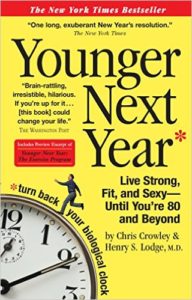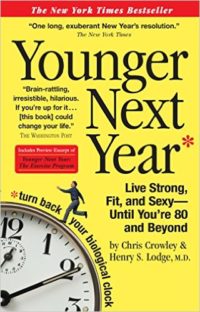 Written by: Henry S. Lodge, M.D. and Chris Crowley
Written by: Henry S. Lodge, M.D. and Chris Crowley
Reviewed by: Susan MacKenzie
Although most of our members are in a younger demographic than myself, I’ve chosen this book as one that has made the most impact on me over the past couple of years and I wish I’d discovered it earlier. Younger Next Year, co-written by Henry S. Lodge M.D. and Chris Crowley, is about the long term effects of regular exercise, and states you can avoid 70 percent of the normal problems of aging and eliminate 50 percent of illness and injury by following Henry’s Six Rules as outlined in the book.
The Premise: Why you should engage in really robust exercise six days a week for the rest of your life is the premise of this book and the first of Harry’s Six Rules. Before you stop reading right here (are you kidding?/what about my day job?/I’ve got kids!) I’ll add my own “I hate exercise!” excuse too. However, the science is compelling – we have a choice to either grow or decay. We actually start to decay around the age of 32 (Millenials are you listening?) unless we do what we are evolutionarily designed to do. Our ancestors were in survival mode with intense physical activity for thousands of years – simply put, we are made to move. It has only been less than a hundred years since most people in this world were in physically active roles for work or daily living. Our bodies have not evolved enough for the technological ease of today. Our lizard brain needs connection to physical activity to send out the messages to grow versus decay.
Exercise is referred to as the master signaller for growth. When you exercise, your brain sends out hundreds of chemical messages. It signals the need to repair the inflammation that was caused by stressing your muscles, and then our body shifts into repair mode to regenerate not only your muscles, but encourage the growth of your joints, bones, organs, and your brain. This growth not only has a short term gain, but has long term benefits that slow down decay as we get older.
One of the biggest challenges is that it’s the quality of exercise that matters – serious strength training and intense aerobic exercise are key. Golf, gardening and walking won’t cut it. My dad is a perfect example – he will be 87 this year. At 80 he gave up cross-country skiing to take up snowshoeing in the Rockies, 3 times a week. I still can’t keep up to the pace he maintains while hiking. I know I’d rather age his way if possible. His mantra? “Shut up and keep moving!” Of course, there’s a genetic lottery at play, but his ‘living proof’ is compelling. Harry’s common sense rules also include things like “Quit eating crap!” (but I’m sure you already knew that) among others.
The Bottom-line: The book has lots of anecdotes on the types of exercise, how to keep it interesting, different warnings for aging gracefully (like how not to be a grumpy old man/lady) and lots of stories from people who are living it now. I think the anecdotes tie well into any goal-setting we do as leaders – whatever goal we set we identify what inspires us, what obstacles will we face and how will we make a new habit. I found the book convincing and persuasive. The chapters alternate between the science and application in real life, although I found Chris Crowley’s enthusiasm a bit taxing by the end of the book. The original version was written for men and there’s a newer women’s version. I found that the men’s worked fine for me.
Recommendation: At The Roundtable, taking care of the golden goose (that’s you) so you can continue leading your business unit, your family or your community seems to be more challenging than ever. Aptly put in Younger Next Year, “life is an endurance event, train for it”. You may not be ready for Younger Next Year but I’ll guarantee that someone in your life who really matters to you is.




